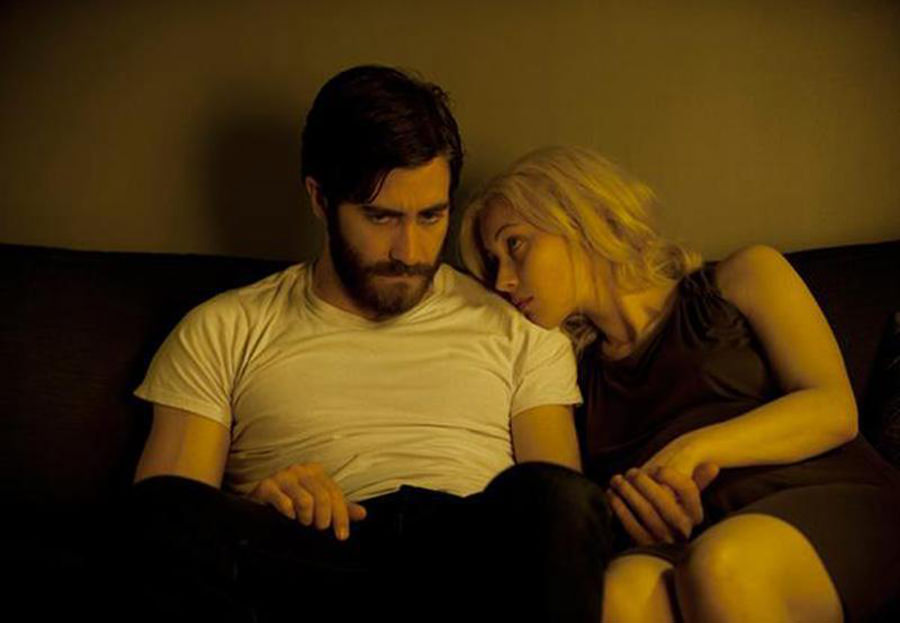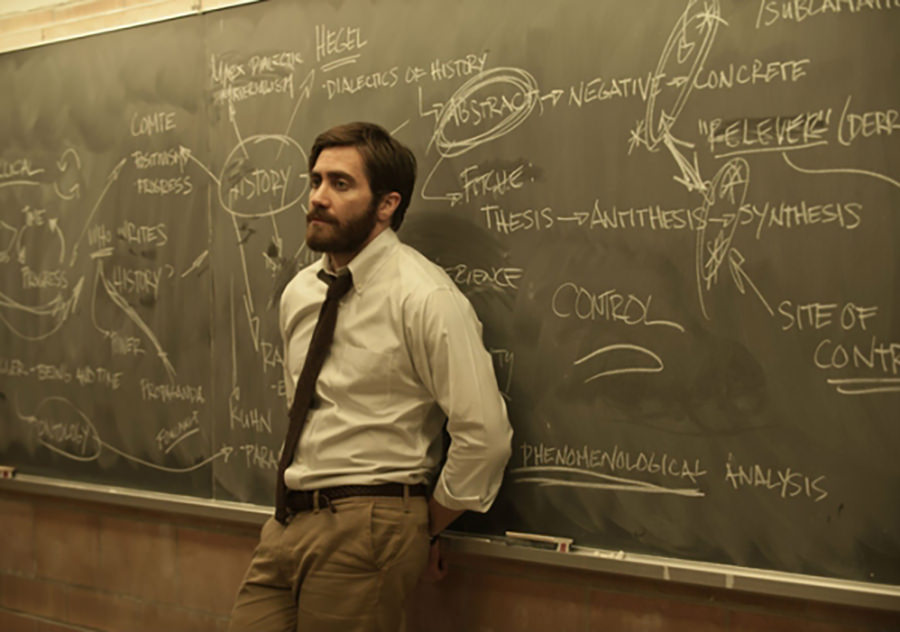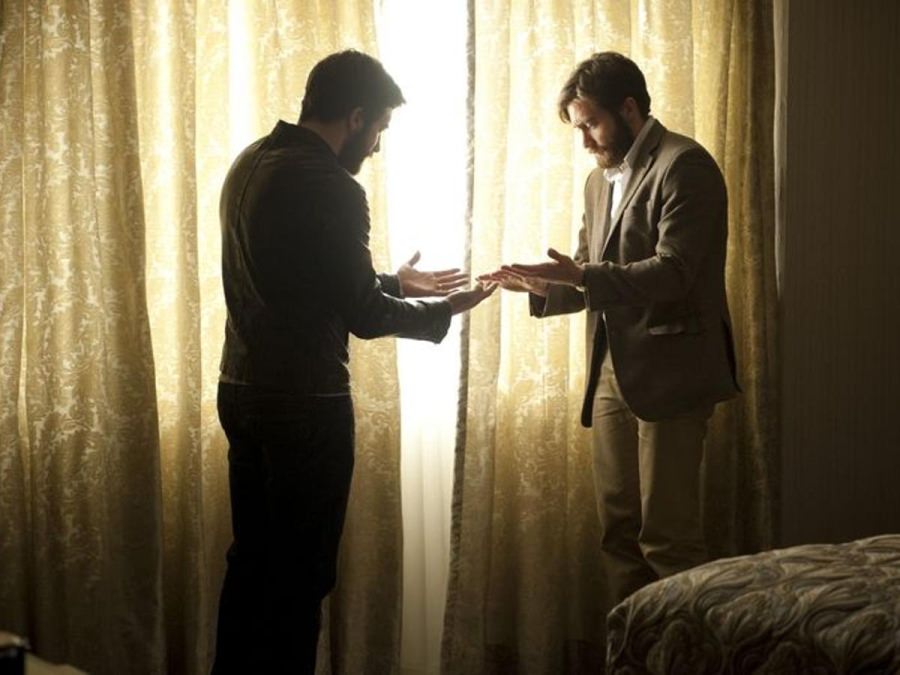Enemy
Directed by Denis Villeneuve (2013) **
 Before Denis Villeneuve became known as a director of science fiction films (he’s going for five in a row now, with Arrival, Blade Runner 2049, Dune, Dune II and Rendezvous with Rama), he excelled at risk-taking, relatively low-budget psychological dramas. In between Prisoners (2013) and the political thriller Sicario (2015), both worth seeing, he filmed, in Canada, the more obscure Enemy.
Before Denis Villeneuve became known as a director of science fiction films (he’s going for five in a row now, with Arrival, Blade Runner 2049, Dune, Dune II and Rendezvous with Rama), he excelled at risk-taking, relatively low-budget psychological dramas. In between Prisoners (2013) and the political thriller Sicario (2015), both worth seeing, he filmed, in Canada, the more obscure Enemy.
Jake Gyllenhaal has a double role in the film (his career was on a roll at the time; his next film would be the career high Nightcrawler). He inhabits physical doubles, a philandering actor (Anthony) and a dweebish, stuck-in-the-ruts history professor (Adam). Enemy begins with a concerned voicemail from his/their mother (Isabella Rossellini), then cuts to Anthony in a bizarre, Eyes Wide Shut-like secret sex club wherein high-heeled models step on tarantulas. This will give you an idea of the film’s overuse of symbolism, which tips the whole endeavor into pretentiousness.
Enemy does, though, begin intriguingly. Adam, who is shown lecturing on the cyclical nature of history and the means by which totalitarian regimes suppress individuality, seems to suffer similar fates in minor ways. His routines, including a relationship with a girlfriend, Mary (Mélanie Laurent) are predictable and joyless.  When a co-worker suggests he relax and watch a comedy movie, “Where There’s a Will There’s a Way” (Adam, generally speaking, doesn’t enjoy watching movies), the high-gloss colorful farce, which looks like a Pedro Almodovar romp, doesn’t make an impression on him — until he dreams of the film and remembers/dreams seeing a bit-part actor in the film who looks like him.
When a co-worker suggests he relax and watch a comedy movie, “Where There’s a Will There’s a Way” (Adam, generally speaking, doesn’t enjoy watching movies), the high-gloss colorful farce, which looks like a Pedro Almodovar romp, doesn’t make an impression on him — until he dreams of the film and remembers/dreams seeing a bit-part actor in the film who looks like him.
Scanning through the DVD to verify if he really saw what he dreamt he saw, Adam finds the actor and researches him online. Determined to track down this doppelganger, Adam enters the actor’s talent agency offices, is misjudged by the friendly desk clerk to be Anthony and is given a mysterious envelope — an invitation to said sex club. He also dares to awkwardly call Anthony’s apartment, but is answered by Anthony’s suspicious, pregnant wife, Helen (Sarah Gadon). As Helen, Mary, Anthony and Adam’s lives begin to intertwine, and the subtle and eventually ruthless rivalry between the two look-alikes simmers, it becomes increasingly clear, to this viewer at least, that the two personas are one and the same (a premise predicated on many otherwise unexplainable details) and that only one will survive this psychological/philosophical crisis.
 A warning: Enemy may make you feel nauseous. It’s filmed in a sickly yellowish beige that renders everything potentially joyful in life in soul-deadening hues. Though this intentionally reflects the theme of life under authoritarianism, as does the droning electronic music score, it doesn’t make watching the film something I can recommend. And what is the authoritarianism Adam/Anthony live under? The screenplay clearly points to women, from Adam/Anthony’s judgmental mother to Mary and Helen, Helen’s complaint being Anthony’s habitual cheating on her. A reasonable concern, one may think, making Enemy‘s two protagonists essentially misogynistic.
A warning: Enemy may make you feel nauseous. It’s filmed in a sickly yellowish beige that renders everything potentially joyful in life in soul-deadening hues. Though this intentionally reflects the theme of life under authoritarianism, as does the droning electronic music score, it doesn’t make watching the film something I can recommend. And what is the authoritarianism Adam/Anthony live under? The screenplay clearly points to women, from Adam/Anthony’s judgmental mother to Mary and Helen, Helen’s complaint being Anthony’s habitual cheating on her. A reasonable concern, one may think, making Enemy‘s two protagonists essentially misogynistic.
Like the similarly-toned The Lighthouse (2019), the fantastical elements Enemy incorporates into its themes and imagery recall Magic Realism, but reach further back to Lovecraft, Kafka and Edgar Allen Poe (“William Wilson”). A minor work by Villeneuve, it’s compelling as far as it goes, but can be a tough sell to those not in the mood for a work so depressing. There were times watching it when I considered that watching “Where There’s a Will There’s a Way” might have better hit the spot.
—Michael R. Neno, 2022 January 24